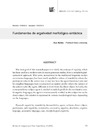Identificador persistente para citar o vincular este elemento:
https://accedacris.ulpgc.es/jspui/handle/10553/11201
| Título: | Fundamentos de ergatividad morfológico-sintáctica | Autores/as: | Núñez Méndez, Eva | Clasificación UNESCO: | 570107 Lengua y literatura 550510 Filología |
Palabras clave: | Ergativity Transitivity Intransitivity Grammar Latin |
Fecha de publicación: | 2012 | Publicación seriada: | LFE. Revista de Lenguas para Fines Específicos | Resumen: | The main goal of this research paper is to clarify the concept of ergativity, which has been used as a modern term in recent grammar studies, from a morpholo gicalsyntactical approach. This term, nonexistent in the traditional linguistic studies on romance languages, has been newly applied to values of transitivity where the participant roles in the action may or may not have the agent function. latin and his daughter-languages have a syntactical accusative profile where the subject of the action is also the agent, different in form from the direct object. in latin, the correspondence subject-agent is marked morphologically in the nominative case. in ergative languages, the agent is not necessarily marked as the subject but as the direct object; this relation is expressed in various morphological ways depending on the languages. | URI: | https://accedacris.ulpgc.es/handle/10553/11201 | ISSN: | 1133-1127 | Fuente: | LFE. Revista de lenguas para fines específicos. Las Palmas de Gran Canaria: Universidad de Las Palmas de Gran Canaria, 1993-.-- ISSN 1133-1127.-- n. 18, 2012, p. 93 |
| Colección: | LFE, Rev. leng. fines específ. n.18, 2012 Artículos |
Visitas
301
actualizado el 15-ene-2026
Descargas
1.131
actualizado el 15-ene-2026
Google ScholarTM
Verifica
Comparte
Exporta metadatos
Los elementos en ULPGC accedaCRIS están protegidos por derechos de autor con todos los derechos reservados, a menos que se indique lo contrario.
